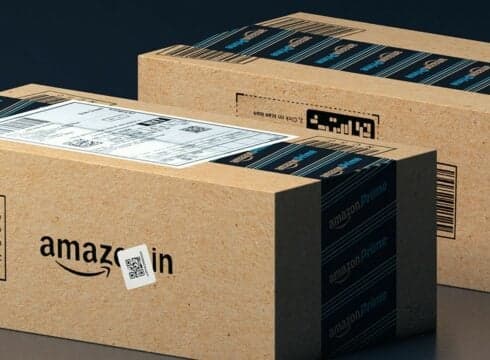Features including easy returns to accessing shopping options in vernacular languages, have enabled Amazon to grow in the country
Amazon is the only ecommerce company to have partnered with Indian Railways and have its own flights under Prime Air, for easy shipments
Amazon’s Seller Flex transformed the seller locations into mini Amazon fulfilment centres, without the Amazon warehouses having to intervene for the shipments
Inc42 Daily Brief
Stay Ahead With Daily News & Analysis on India’s Tech & Startup Economy
Ecommerce giant Amazon has waived off 10% of its seller charges to mark its decade-long presence in India, on June 5. The company, which has been operating in India since June 5, 2013, has grown in the country to enter segments including cloud services, ecommerce, video streaming and more.
According to a Moneycontrol report, the ecommerce giant has over 1.2 Mn sellers in the country which is just marginally higher than Walmart-owned Flipkart with 1.1 Mn sellers.
In a blog post, Amazon mentioned that from the first day, the company’s approach was to digitise businesses of all sizes to enable the largest selection of products with the use of technology to remove inefficiencies and unlock greater value for customers.
Factors That Delivered Growth In India
According to the company, from easy returns to accessing shopping options in vernacular languages, features offered by Amazon ecommerce platform enabled the company to garner popularity across the country.
As the company celebrates a decade-long presence in India, it stands to be the only ecommerce company to have partnered with the Indian Railways and have its own flights under Prime Air, for easy shipments.
Commenting on the connectivity of the company, Abhinav Singh, VP of Operations said, “Nobody had the kind of reach that India Post did, but they were set up differently. Back then, they did not carry electronic products. We went through several months of discussions with them about the possibilities that e-commerce could unlock. Finally, they saw that this was a good move for India.”
Teething Issues
Though Amazon claims that the initial days of onboarding sellers weren’t easy as the Indian market, back in 2013 was different and both customers and sellers were not exposed to ecommerce. “This challenge needed not just innovation, but Indian ingenuity and execution agility,” writes the ecommerce giant.
During the initial period, the company had only two fulfilment centres which were in Mumbai and Bengaluru. But Vivek Somareddy, VP of Seller Fulfilment, Emerging Markets and India Exports said that with the growing demand and sellers lining up on the platform, Amazon launched Seller Flex. This transformed the seller locations into mini Amazon FCs, without the Amazon warehouses having to intervene for the shipments.
The Road Ahead
Today, Amazon looks at further exploring the business potential in the country citing the rising population of the young crowd. Commenting on this, Manish Tiwary, country manager, India Consumer Business said, “With a young and vibrant population, rising income levels, and increasing penetration of internet and social media, the future is exciting. We remain committed to innovating for customers, and enabling small businesses and startups to contribute to India’s vision of becoming a $1 Tn digital economy.”
This year, in February, in a statement, the company said that its business in emerging countries including India, Brazil, and the Middle East would take some time to become profitable, but these markets have high potential and are on the right trajectories.
The company eyes the online grocery segment in India, as a space for growth. In April, Amazon Fresh announced that by this year, it has expanded to more than 50 cities in India, against only 22 cities a year back.
{{#name}}{{name}}{{/name}}{{^name}}-{{/name}}
{{#description}}{{description}}...{{/description}}{{^description}}-{{/description}}
Note: We at Inc42 take our ethics very seriously. More information about it can be found here.


